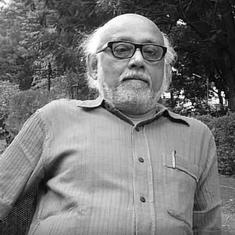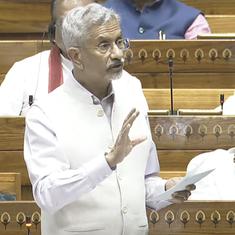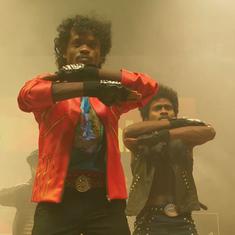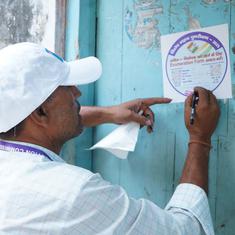In the light of a (poorly disguised?) Nazi salute by an American oligarch (or future president?), the message in Loka is crystal clear. If you don’t like the people, the place isn’t worth living in. Even though stories make a big deal out of home and belonging, SB Divya advocates cutting off roots, shaking off the dust on your wings and just taking off for a better place. Telling you more than this would be a spoiler.
In a world governed by more and more far-right leaders, writers remind us of humanity’s liberal thoughts and values through stories. And Loka does this through its pro-immigration, leave-your-home-behind-go-search-a-new-world story. With all that talk of going to live on a new planet Meru in the book, I couldn’t pull my mind away from the hints it threw at the current political scenario. Although the book was written before the new US President was sworn in, it resonates even more so today.
Through Loka, SB Divya asks us where is home. What is home? Is it a place where you want to be? Or is it somewhere you can live without biases and prejudices? Would you prefer sparkling oceans and discriminating people or a very small knot of people living on barren land on an alien planet with no flora and fauna except single-celled cyanobacteria?
After the aftermath
Stories set in a dystopian world have long been a staple for fantasy buffs and writers alike. The ravaged earth, the zombies and mutated creatures running amok in a maddening world are fodder for singular tales. Loka introduces a fresh perspective to this sub-genre. For Loka is set in a utopian world. All the destruction that was meant to happen has happened, not only on Earth but on Mars too. The humans, after breaking the earth, wreaked havoc on Mars with their senseless experiments, rendering it uninhabitable.
Now, the alloys are in charge. Alloys are genetically engineered beings with two sets of DNAs. They are smarter, wiser, bigger and very uninterested in humans. Humanity now lives in Loka, a region on Earth where almost everything has been restored and everyone is kind. The animals have been weaned of their ferocity and there are no conflicts. Electricity comes from bioluminescence. There are no processed foods, no alcohol, and nothing to smoke. Money can be used only in a place called Out of Bounds. Doors have no locks, just a privacy curtain. And the most important thing? There is no God, no religion. Alloys are the masters and the controllers. They can live in space, earth or water and tend to the needs of the planet like a mother would. They are the dominant species of the Constructed Democracy of Sol.
Here, Akshaya wants to finish an Anthro challenge, a parikrama of the planet. With her best friend Somya, her heartsib, she wants to circumnavigate the Earth, just like Rune did years ago. But if you want to do the Anthro challenge, there are rules to follow. You have to cross the equator at least twice. You have to use human-era technology. You can’t take any alloy’s help, even if you are in grave danger or your health deteriorates. And Akshaya is sick a lot since she has sickle cell anaemia.
A new Earth
In SB Divya’s previous novel Meru, the first part of this space-saga, Akshaya’s mother Jayanthi sets out to Meru, a new planet where sometime in the future humanity could settle. But the oxygen in the atmosphere is too much. That is a plus for Jayanthi because she has sickle cell anaemia where her blood cells demand more oxygen. She falls in love with an incarn of an alloy Vaha (an alloy can reproduce their consciousness in the form of a human being that exists separately from their human body.) She then designs a child, combining the DNA of both. This child would be ideal to live on Meru. But the whole point for Akshaya to do the Anthro challenge is that she wants to spend her life on Earth with her friend Somya and not on Meru which is very sparsely populated. Akshaya has spent her life on a huge city-like spaceship because her parents have been exiled for making her. Now, the more her mother tells her she’s better suited for life in Meru, the more she feels the Earth’s pull.
Akshaya sets out on this journey despite her mother Jayanthi’s reluctance. The obstacles in her path are quite commonplace. Divya has treated her protagonists as regular people. So if crossing a raging river is challenging for us, it is so for them too. What we find are real dangers: storms, diseases, and so on.
Akshaya is resolute in completing the challenge but she is also ready to drop it if harm comes to her heartsib. The description of her catching a fever and losing consciousness under a starlit sky is enigmatic. She is our eyes to a new Earth as she looks at everything with a sense of wonder: “The unceasing rush of waves had a musicality that I’d never noticed before, and I stood for many minutes just listening to it. The vastness of the water awed me. I’d seen the immersiveness of the ocean, but nothing could compare to the reality of its mass. So much water! I tasted the saltiness in the spray, felt the sting of sand in my shins, watched the sunlight shimmer on its surface.”
Divya writes with a tenderness which is evident in every page. Everything, all matter has some consciousness, she argues. All forms of consciousness have equal value in the universe. Hence, it is only natural when her characters send silent apologies to the soil when their solar bikes erode it.
There is a line that has stayed with me: “The paths we walk matter more than the houses we build.”

Loka, SB Divya, Hachette India.










